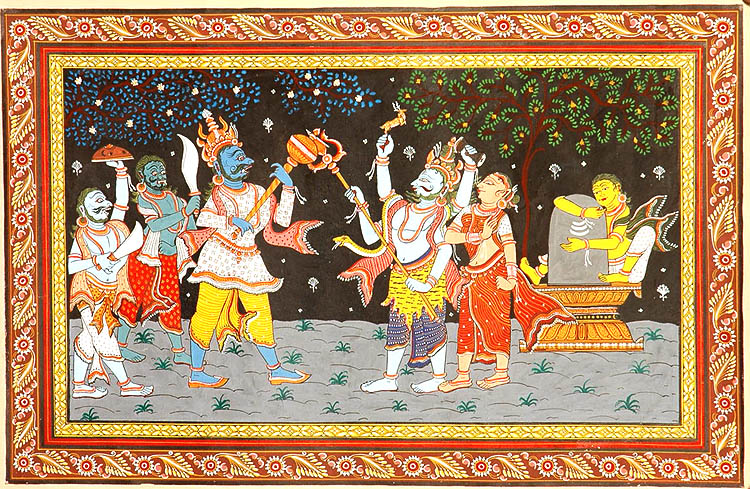P.J.
0
Theory and Practice of Karma: Some Salient Features
There are three divisions of Karma: Prarabdha, Sanchita and Agami.
Prarabdha: Everyone performs a lot of karma in the present and previous lives. Only a certain fraction of this karma is chosen by God in order to form the blueprint of our next birth. In this way, the karma brought over from the previous births, which determines our present birth, is known as prarabdha karma.
Sanchita: All the karma of our previous births which remains after prarabdha has been taken out is known as sanchita karma.
Agami: This is karma that one accumulates during the present birth. At the moment of death, this joins the sanchita karma and next birth is determined by a fraction of karma taken out from this sum. The fruit that one experiences in this birth is due to prarabdha and a portion of the present agami. Though prarabdha is exhausted fully by the time of death, only a fraction of Agami is used now, and the rest is added to sanchita at death.
Question: This refers only to the karma of human beings. What about the karma of animals?
Reply: There is no agami karma for animals. They have only prarabdha and sanchita karma. The jiva born as an animal spends only his papa karma, which caused him the animal life in the first place. In other words, he experiences only his prarabdha karma. For example, a tiger does not accrue papa by killing a cow. Similarly, a fish in the Ganga does not accrue punya because of always living in Ganga. After spending this karma, they go back as human beings; their future birth being again determined by a fraction of the remaining sanchita karma.
An Important Question: Is it possible to change one’s karma or one necessarily has to experience its fruit?
Answer: Karma can certainly be changed by another karma, which is its antidote. A good karma can be annulled by a bad karma and a bad one by a good one. Whenever prarabdha shows up through a pleasant result, it is punya and and the one ending up in grief, is papa. The moment there is grief, we would like to annul that papa. The karma required for this is prayashchitta. It has mainly three components viz japa, dana and upavasa. Prayashchitta differs only in the quality and quantity of these three aspects. One may have to do more upavasa or less upavasa, do this dana or that dana or do this japa or that japa and so on. Upavasa and dana cannot be done by everybody. A diabetic patient or a person with stomach ulcer cannot do upavasa. A poor man cannot do dana. But there is no such constraint on japa. The rishis relax the rules of japa to facilitate anybody to do it. If one cannot squat, one can sit on a chair and even if that is not possible, one may lie down and do japa.Therefore, everyone, for everything - either to get rid of papa or acquire punya, should resort to japa.
Doubt: But many times, even after doing prayashchitta and punya karma, one may not be rewarded. Sometimes we also hear that prarabdha cannot be got rid of. It has to be spent through. Can you explain this?

Resolution: Prarabdha is after all our own karma done during previous lives. Of course, we do not know how much or what exactly it is. Nevertheless, it has to be experienced. But it is possible to rectify it through prayashchitta. For example, Markandeya, who had to die at the age of 8 due to his prarabdha, overcame it through tapasya and lived long.
Savitri, whose prarabdha destined her for widowhood, overcame it by tapasya.
But many times common people will not be able to do that kind of tapasya necessary to overcome the prarabdha. Because we are ignorant of the amount of prarabdha, its annulment is to be seen only after the present tapasya overcomes it. The tapasya may be lacking in its quality or quantity or both. Bhagawan Vyasa says that for the full result of the karma to manifest, three things are necessary. They are: concentration of mind, correctness in the performance of karma and dana. Sometimes, when we do not succeed, it would be wrong to conclude that prarabdha cannot be mitigated. We have to step up only the quality and quantity of the tapasya.
Remaining Doubt: Then how to understand the statement that prarabdha should unavoidably be experienced?
Answer: It is like this: The trouble that one undergoes during tapasya will itself account for the grief to be experienced due to prarabdha.
Question: Then which is better - experiencing prarabdha as such without any prayashchitta or experiencing it through the prayashchitta to overcome the prarabdha?
Answer: It depends upon one’s attitude. People with vairagya who are concentrating on moksha, experience the prarabdha and do not bother to have prayashchitta. This amounts to undergoing pain voluntarily for a higher cause. Therefore, this itself is tapasya. But common people should not do like that. They have various duties to attend to. Therefore, they should overcome it by doing the tapasya of prayashchitta. This will not only mitigate grief but also increase faith in God.
This article is based almost entirely on the teachings of Pujya Swami Paramanand Bharati Ji. However, any errors are entirely the author's own.
References & Further Reading:
Theory and Practice of Karma: Some Salient Features
There are three divisions of Karma: Prarabdha, Sanchita and Agami.
Prarabdha: Everyone performs a lot of karma in the present and previous lives. Only a certain fraction of this karma is chosen by God in order to form the blueprint of our next birth. In this way, the karma brought over from the previous births, which determines our present birth, is known as prarabdha karma.
Sanchita: All the karma of our previous births which remains after prarabdha has been taken out is known as sanchita karma.
Agami: This is karma that one accumulates during the present birth. At the moment of death, this joins the sanchita karma and next birth is determined by a fraction of karma taken out from this sum. The fruit that one experiences in this birth is due to prarabdha and a portion of the present agami. Though prarabdha is exhausted fully by the time of death, only a fraction of Agami is used now, and the rest is added to sanchita at death.
Question: This refers only to the karma of human beings. What about the karma of animals?
Reply: There is no agami karma for animals. They have only prarabdha and sanchita karma. The jiva born as an animal spends only his papa karma, which caused him the animal life in the first place. In other words, he experiences only his prarabdha karma. For example, a tiger does not accrue papa by killing a cow. Similarly, a fish in the Ganga does not accrue punya because of always living in Ganga. After spending this karma, they go back as human beings; their future birth being again determined by a fraction of the remaining sanchita karma.
An Important Question: Is it possible to change one’s karma or one necessarily has to experience its fruit?
Answer: Karma can certainly be changed by another karma, which is its antidote. A good karma can be annulled by a bad karma and a bad one by a good one. Whenever prarabdha shows up through a pleasant result, it is punya and and the one ending up in grief, is papa. The moment there is grief, we would like to annul that papa. The karma required for this is prayashchitta. It has mainly three components viz japa, dana and upavasa. Prayashchitta differs only in the quality and quantity of these three aspects. One may have to do more upavasa or less upavasa, do this dana or that dana or do this japa or that japa and so on. Upavasa and dana cannot be done by everybody. A diabetic patient or a person with stomach ulcer cannot do upavasa. A poor man cannot do dana. But there is no such constraint on japa. The rishis relax the rules of japa to facilitate anybody to do it. If one cannot squat, one can sit on a chair and even if that is not possible, one may lie down and do japa.Therefore, everyone, for everything - either to get rid of papa or acquire punya, should resort to japa.
Doubt: But many times, even after doing prayashchitta and punya karma, one may not be rewarded. Sometimes we also hear that prarabdha cannot be got rid of. It has to be spent through. Can you explain this?

Resolution: Prarabdha is after all our own karma done during previous lives. Of course, we do not know how much or what exactly it is. Nevertheless, it has to be experienced. But it is possible to rectify it through prayashchitta. For example, Markandeya, who had to die at the age of 8 due to his prarabdha, overcame it through tapasya and lived long.
Savitri, whose prarabdha destined her for widowhood, overcame it by tapasya.
But many times common people will not be able to do that kind of tapasya necessary to overcome the prarabdha. Because we are ignorant of the amount of prarabdha, its annulment is to be seen only after the present tapasya overcomes it. The tapasya may be lacking in its quality or quantity or both. Bhagawan Vyasa says that for the full result of the karma to manifest, three things are necessary. They are: concentration of mind, correctness in the performance of karma and dana. Sometimes, when we do not succeed, it would be wrong to conclude that prarabdha cannot be mitigated. We have to step up only the quality and quantity of the tapasya.
Remaining Doubt: Then how to understand the statement that prarabdha should unavoidably be experienced?
Answer: It is like this: The trouble that one undergoes during tapasya will itself account for the grief to be experienced due to prarabdha.
Question: Then which is better - experiencing prarabdha as such without any prayashchitta or experiencing it through the prayashchitta to overcome the prarabdha?
Answer: It depends upon one’s attitude. People with vairagya who are concentrating on moksha, experience the prarabdha and do not bother to have prayashchitta. This amounts to undergoing pain voluntarily for a higher cause. Therefore, this itself is tapasya. But common people should not do like that. They have various duties to attend to. Therefore, they should overcome it by doing the tapasya of prayashchitta. This will not only mitigate grief but also increase faith in God.
This article is based almost entirely on the teachings of Pujya Swami Paramanand Bharati Ji. However, any errors are entirely the author's own.
References & Further Reading:
- Bharati, Swami Paramananda. Foundations of Dharma: Bangalore 2008
Theory and Practice of Karma: Some Salient Features


